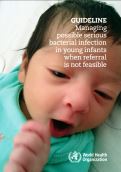Referral care represents an important step in the management of the sick child.
One of the key aspects of the IMCI training is that the primary health care provider is trained to recognize children with severe conditions who require urgent hospital management. These situations are considered medical emergencies at that level of the health system.
Pre-referral treatment
The health provider is therefore trained to administer any pre-referral, urgent treatment as needed, to reduce the delay in initiating treatment at the referral site caused by the long time that the referral process may take. Many deaths in severe cases occur in fact on the way to the hospital or during the first 24 hours of hospitalization.
The provider also plays an important role in advising and supporting the sick child’s caretakers, to explain the need for taking the child to a hospital without delay and overcoming existing cultural barriers.
Emergency triage assessment
Emergency triage assessment—for rapid screening of sick children upon arrival at a hospital—and treatment is a key area of referral management. A training course has also been developed by WHO on “Emergency Triage Assessment and Treatment course”.
This area is also emphasized in the guidelines for care at the first-referral level in developing countries, consistent with the IMCI approach for outpatient care, that WHO has developed as a reference manual “Management of the child with a serious infection or severe malnutrition”. The Regional office has translated the document into Arabic to make it available to a wider audience in the Region.
The aim is to provide immediate emergency treatment where needed, give priority to severe cases over other waiting patients, and distinguish emergency and priority cases from those who do not need urgent care.
A pocket-size manual on hospital care for children has also been developed by WHO for inpatient care of major causes of childhood mortality in small hospitals in countries with limited resources. The book has been translated into more than 20 languages.
Paediatric emergency triage, assessment and treatment: care of critically-ill children
Serious childhood problems in countries with limited resources
When referral is not possible
When referral is not possible the situation is complex. Families, especially the poor and disadvantaged, may find it difficult to find the resources to afford transportation to the referral site—when transportation is available—and all other related expenses in case of hospital admission of the child, unless financing schemes exist and community resources are mobilized.
In addition WHO has worked with partners to develop technical guidelines to support programme managers and care providers to provide the optimum care to children when referral is not possible. In this regard, a guideline on managing possible serious bacterial infection was published in 2015 to bridge such an important gap.
System and community support to referral
These and other issues clearly underline the importance and need to address together health system issues (health financing to guarantee equitable access also to hospital care) and community issues (e.g. support mechanisms), in addition to clinical care. They support the view that child care should be seen and implemented comprehensively rather than as a series of vertical programmes or independent interventions.
While the referral hospital is expected to provide higher-level management of severe cases, in reality this often requires further upgrading of its staff’s clinical management skills. Referring a child is, therefore, only part of the solution.


 Guideline: Managing possible serious bacterial infection in young infants when referral is not feasible
Guideline: Managing possible serious bacterial infection in young infants when referral is not feasible